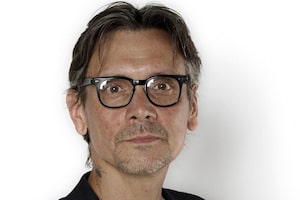French writer-director Olivier Assayas in Toronto.Fred Lum/The Globe and Mail
Unlike many French teenagers who would grow up to become filmmakers, 16-year-old Olivier Assayas didn't care much about movies. His principal passions were politics, painting and pop music, and not always in that order. Now 58 years old and one of the world's most celebrated directors (Irma Vep, Summer Hours, Carlos), he has made a fictionalized movie, called Something in the Air, about the kid he was back in 1971, when the long shadow of May, 1968 – the month a general nationwide strike mobilized a revolutionary consciousness that reverberates to this day – made coming of age an especially awkward ordeal. Assayas sat down in Toronto recently to talk about how the teenager informed the man.
You've touched on this period before, early in your career with Cold Water, and a couple of years ago in Carlos. Why again, and why autobiographically?
I kind of reconnected with the teenager I had been, whom I'd lost track of, and that opened the door to a lot. Yes I made a movie about the 1970s, but there's so much more to it than that. Those were years that ultimately made me the person I am, and that movies, at least French movies, have not really explored. The politics of those times, the attraction of the Orient, the counterculture, all of that. So Cold Water kind of released it and I said maybe one day I will make a companion piece, but it was never really the right time.
And in Carlos I showed the dark side of the 1970s, but what was missing from the film – obviously it couldn't be there – was my own experience of the period, which was much brighter. There was hope, there was faith, there was idealism, there was madness, but there was also something naive and beautiful. I thought movies had never really captured the naiveté and beauty of the seventies, so I thought there was space for a movie about that.
Your character in the movie is a teenager called Gilles, and he's struggling between his desire to be a painter and his presumed duty to be a revolutionary. There's a definite split between the counterculture and politics, and it ultimately pulls the character away from his radicalism.
It's a matter of balance. You had the two strains everywhere, the counterculture and leftism, it's more what the blend was about. In North America the blend was more counterculture and less radical politics. In France it was mostly radical politics and a tiny bit of counterculture. So the kids influenced by the counterculture like I was were very much in the minority. They were an active minority, very present, but it was marginal. And you had to deal with this very powerful leftist culture which was extremely dismissive of whatever the counterculture was about. It hated it. It hated its guts. Anything that had to do with liberation of individuals, drugs, sex, whatever, they absolutely rejected it because it was supposed to be a bad influence on young workers. The official discourse was that it was a way of distracting young workers from their main duty, which was to be revolutionaries.
But it's this sense of responsibility that seems to be alienating Gilles. He's revolutionary because he feels has has to be, when what he'd really rather do is paint.
You must remember the difference with France is you had this moment of impact – May '68. It kind of blows up in everybody's face, including leftists. Nobody really knows what happened and they're still debating it today. It's this moment of anarchy. You unleash very powerful forces and don't know what will happen with them. And the years that followed were obsessed with the notion that 1968 was a failed revolution that actually anticipated an successful revolution, which was obviously coming, which had to be coming. So it was not so much a matter of political hope but of political conviction that those were revolutionary years. So the most important thing was how you were a part, or not, of what was transforming society in such deep ways.… Everybody in one way or another felt part of it.
Those years were about rebellion, but not as a posture of rebellion as it is today. Rebellion was the only possible way of being alive in the modern world. There was no other language really, especially in art, so you stay with that and you end up being extremely reticent to anything, including anything that has to do with stereotyping rebellion. You always have a sense that you need that confrontation in one way or another.
What would the Olivier who was 16 in 1971 think of the Olivier of today? Would he recognize him?
When I made this film I also realized how much I was shaped by those times. I was shaped by that period and ultimately whatever my movies are about it's also about keeping alive something of the teenager I was and the hopes and dreams of that teenager. And I suppose the reason why I regularly go back to that period is because once in a while I need to be able to look that teenager in the eye and have a sense that I have not gone too far from the idea I had of what movies should be or that they could be made.
This interview has been condensed and edited.
 Geoff Pevere
Geoff Pevere